2022-2023 学年江苏省连云港市高三上学期期中英语试题及
答案
注意事项:
1. 答卷前,考生务必将自己的姓名、准考证号填写在答题卡上。
2. 回答选择题时,选出每小题答案后,用 2B 铅笔把答题卡上对应题目的
答案标号涂黑。如需改动,用橡皮擦干净后,再选涂其他答案标号。回答非选择题时,将
答案写在答题卡上,写在本试卷上无效。
第一部分听力(共两节,满分 30 分)
第一节(共 5 小题;每小题 1.5 分,满分 7.5 分)
听下面 5 段对话。每段对话后有一个小题,从题中所给的 A、B、C 三个选项中选出最佳选
项。听完每段对话后,你都有 10 秒钟的时间来回答有关小题和阅读下一小题。每段对话仅
读一遍。
1. 【此处可播放相关音频】
When does the tour start?
A. 13:25.
【答案】B
【解析】
B. 13:35.
C. 13:45.
【原文】W: Hurry up! The tour will begin in 15 minutes. We are going to be late.
It’s already 13:20!
M: No worries, my clock is 10 minutes fast.
2. 【此处可播放相关音频】
Where are the speakers?
A. In a hotel.
B. In a bank.
C. In a shop.
【答案】B
【解析】
【原文】M: Next please?
W: Good afternoon. I’d like to pay this check into my account.
M: Good afternoon. Can I please have your account details?
W: Yes, here is my card. It has the account number.
�
3. 【此处可播放相关音频】
What is the man?
A. A tailor.
B. A salesman.
C. A mechanic.
【答案】C
【解析】
【原文】M: It looks like your engine’s been running low on oil, and that caused
a bit of damage. I’ll have to keep it overnight and repair it in the morning.
W: Ugh … I should’ve paid attention to the head light. But how am I going to get
home tonight?
M: We have an older model we could loan to you until tomorrow.
4. 【此处可播放相关音频】
What is the man’s problem?
A. He can’t get the candy bar.
B. He can’t get his change back.
C. He can’t put money into the machine.
【答案】B
【解析】
【原文】W: Hey, man. What’s up?
M: Ah, I put a dollar in the machine for a candy bar, and I got the thing. Then,
I pressed the change button, but nothing came out. The machine still owes me a
quarter.
5. 【此处可播放相关音频】
What are the speakers talking about?
A. A present.
B. The woman’s birthday.
C. A thank-you
note.
【答案】A
【解析】
【原文】W: Look at the watch my sister sent today.
M: What was the occasion? Your birthday was in February.
W: It was a thank-you for taking care of her house and pets.
�
第二节(共 15 小题;每小题 1.5 分,满分 22.5 分)
听下面 5 段对话或独白。每段对话或独白后有几个小题,从题中所给的 A、B、C 三个选项
中选出最佳选项。听每段对话或独白前,你将有时间阅读各个小题,每小题 5 秒钟;听完后,
各小题将给出 5 秒钟的作答时间。每段对话或独白读两遍。
听下面一段较长对话,回答以下小题。【此处可播放相关音频】
6. What does the woman think of the sailing course?
A. Satisfying.
B. Discouraging.
C. Boring.
7. What can we learn from the conversation?
A. The equipment was of high quality.
B. The teacher gave clear instructions.
C. The conditions were perfect for sailing.
【答案】6. A
7. C
【解析】
【原文】M: That sailing course was great.
W: I couldn’t agree more. And it was a good job I’d read a bit about how to do
it before I went, because I couldn’t actually hear a lot of what the teacher said.
M: The sails made quite a lot of noise in the wind, but there was just the right
amount for learning how to sail.
W: And the waves were really small too, which made things easier. I think the club
needs to spend some money on new boats, though. The one I was in felt like it might
fall to bits at any moment.
听下面一段较长对话,回答以下小题。【此处可播放相关音频】
8. What made the book interesting according to the man?
A. The main character.
B. The storyline.
C. The language.
9. What is the relationship between the speakers?
A. Interviewer and interviewee.
B. Teacher and
student.
C. Classmates.
【答案】8. A
9. C
�
【解析】
【原文】M: Have you finished that book we’re studying in our literature class yet?
W: Yes, last night I stayed up late because I couldn’t stop reading the last few
pages. I really didn’t expect the hero to be killed.
M: I thought he might be. I read an interview with the author who said some readers
would be disappointed by what happened at the end. I’ve never read anything that
had someone like him as the hero, though. That’s what made it so interesting. Most
books rely on the story and lots happening, but this was more about his thoughts
and feelings.
W: True!
听下面一段较长对话,回答以下小题。【此处可播放相关音频】
10. What is the woman doing?
A. Cleaning the house.
B. Washing clothes.
C. Looking for a
pen.
11. Who is to blame for the mess?
A. Jacob.
B. The woman.
C. The man.
12. What might the man do next?
A. Meet some friends.
B. Make a phone call.
C. Find some
remover.
【答案】10. B
11. C
12. B
【解析】
【原文】W: Oh, man. Someone ran a pen through the dryer, and now all of the clothes
and the dryer are a real mess.
M: Ugh. Wow. That’s rough. Well, I have to go. I’m playing tennis with Jacob in
a few minutes.
W: No way! Wait, wait. What about the mess?
M: Well, uh, what clothes did you have in there?
W: Listen. I had two of my new shirts, a pair of shorts, the children’s running
�
socks, and one of your work shirts.
M: No way!
W: Look! Here’s the pen, and it has your company logo on it. I guess it was your
fault.
M: Oooh. Uh . . .
W: Call your friends and tell them you’re going to be late. And try using this remover.
It’ll help get the ink marks out of the dryer.
听下面一段较长对话,回答以下小题。【此处可播放相关音频】
13. When did Brittany enjoy acting?
A. When she played at being an actress at home.
B. When she attended some acting classes.
C. When she took part in a school play.
14. What did Brittany worry about before her first theatre performance?
A. Forgetting her lines.
B. Using the wrong accent.
C. Appearing in front of the audience.
15. Why did Brittany go into TV acting?
A. She needed to earn more.
B. She lost interest in theatre work.
C. She wanted to try something new.
16. What brings excitement to Brittany?
A. Being offered a new part.
B. Watching her new works on screen.
C. Sharing her performance with her family.
【答案】13. C
14. B
15. C
16. A
【解析】
【原文】M: We’ve got TV actress Brittany Briers in the studio. Brittany, how did
you discover your love of acting?
W: I was always trying to be like TV characters at home but never thought of acting.
�
When I was twelve, Mum sent me to drama classes. Then I learned enough to act in
a school play. Being on stage then was definitely what got me interested!
M: What was your first professional theatre performance like?
W: The person I played had an American accent — I kept thinking I’d go back to
my own. I’m sure things like not remembering your lines are embarrassing when there’
s a huge audience. I made sure that didn’t happen.
M: Later you went into TV acting. Why?
W: I was seen on stage by a director who thought I was perfect for a TV series he
was making. I thought “Why not learn some fresh skills?” The extra money was useful,
but I’d never take a job just for money, though.
M: What do you love most about your job?
W: When a new TV series comes out and my family get excited — but I avoid watching
myself on screen. I get the real excitement from picking up the envelope containing
my new role.
听下面一段独白,回答以下小题。【此处可播放相关音频】
17. What is illegal in Los Cabos?
A. Drinking alcohol.
B. Renting cars.
C. Being drunk in
public.
18. Where are the listeners recommended to exchange their money?
A. At a bank.
B. At the hotel.
C. At a scenery
spot.
19. What advice does the speaker give about getting around the city?
A. Carrying some change.
B. Using public transport.
C. Avoiding traveling at night.
20. Who will probably talk about the special discounts?
A. Luca.
B. Havier.
C. Diego.
【答案】17. C
18. A
19. B
20. A
【解析】
�
【原文】W: Hello everyone. My name is Luca. Welcome you all to Los Cabos. The
bus ride to your hotel will take about fifteen minutes. Right now I’d like to take
a minute to familiarize you with the area. Firstly, please realize that it is against
the law to get drunk in public.
I promise you are going to enjoy your stay here in Los Cabos. This is a beautiful,
quiet city where you can relax, sit by the beach, enjoy great meals and feel very
safe. You can walk into town and enjoy the fountains or take a moonlit walk along
the water. Suntan Tours offers a variety of special discounts depending on your
travel plans. There will be a short information session at 1:00 pm in the hall of
the hotel tomorrow where you can learn all about these offers. If you need to exchange
your dollars into pesos, please use a bank or money exchange. We don’t recommend
exchanging your money neither at the hotel nor at a scenery spot because you won’
t get a fair rate. Also, if you want to get around the city, you’d better off taking
the local bus. If you do decide to take a taxi, make sure that you negotiate a price
before you go.
We’re going to be pulling up to the hotel in just a few minutes. Havier and
Diego will be meeting us at the bus to help you with your bags. I hope to see you
tomorrow at the information session.
第二部分阅读(共两节,满分 50 分)
第一节(共 15 小题;每小题 2.5 分,满分 37.5 分)
阅读下列短文,从每题所给的 A、B、C、D 四个选项中选出最佳选项。
A
Why We Swim
By Bonnie Tsui. 2020. Algonquin, $26.95.
Tsui examines “the universal experience in water,” whether it’
s in an ocean, lake, or swimming pool. Yes, there are chapters devoted
to the extreme side of the sport, but the focus is on ordinary folk
and the positive impact swimming can have on their lives.
�
Two Wheels Good: The History and Mystery of the Bicycle.
By Jody Rosen. 2022. Crown, $28.99.
Rosen offers an interesting and somewhat unconventional
exploration of bicycles from the Victorian era to the present. This
wildly eclectic( 不 拘 一 格 的 )abundance offers a love letter to
bicycling and is sure to be appreciated by fans of all ages.
Harvard Medical School Guide to Tai Chi
By Peter M. Wayne and Mark L. Fuerst. 2013. Shambhala, $15.95.
Tai chi offers a wealth of mental and physical rewards, including
greater
flexibility,
increased
coordination( 协 调 ),
better
breathing, and more efficient gesture—all essential to enjoying
sports for life. Wayne and Fuerst instruct how to get started.
Walking: One Step at a Time.
By Erling Kagge. 2019. Pantheon, $19.95.
Kagge was the first person to walk to the South Pole alone, but
this book isn’t about tough and dangerous journeys; rather, it’
s a guide to walking for pleasure. Writing in an wandering style,
Kagge displays that walking is the essential sport for life, offering
the opportunity to combine movement with reflection.
21. Whose book covers the topic of history?
A. Bonnie Tsui’s.
B. Jody Rosen’s.
C. Peter M. Wayne’s.
D. Erling Kagge’s.
22. What do Harvard Medical School Guide to Tai Chi and Walking have in common?
A. Both are about journeys.
B. Both tell stories.
C. Both are about traditions.
D. Both provide guidance.
23. Who are the target readers of the text?
A. Sports fans.
B. Book publishers.
�
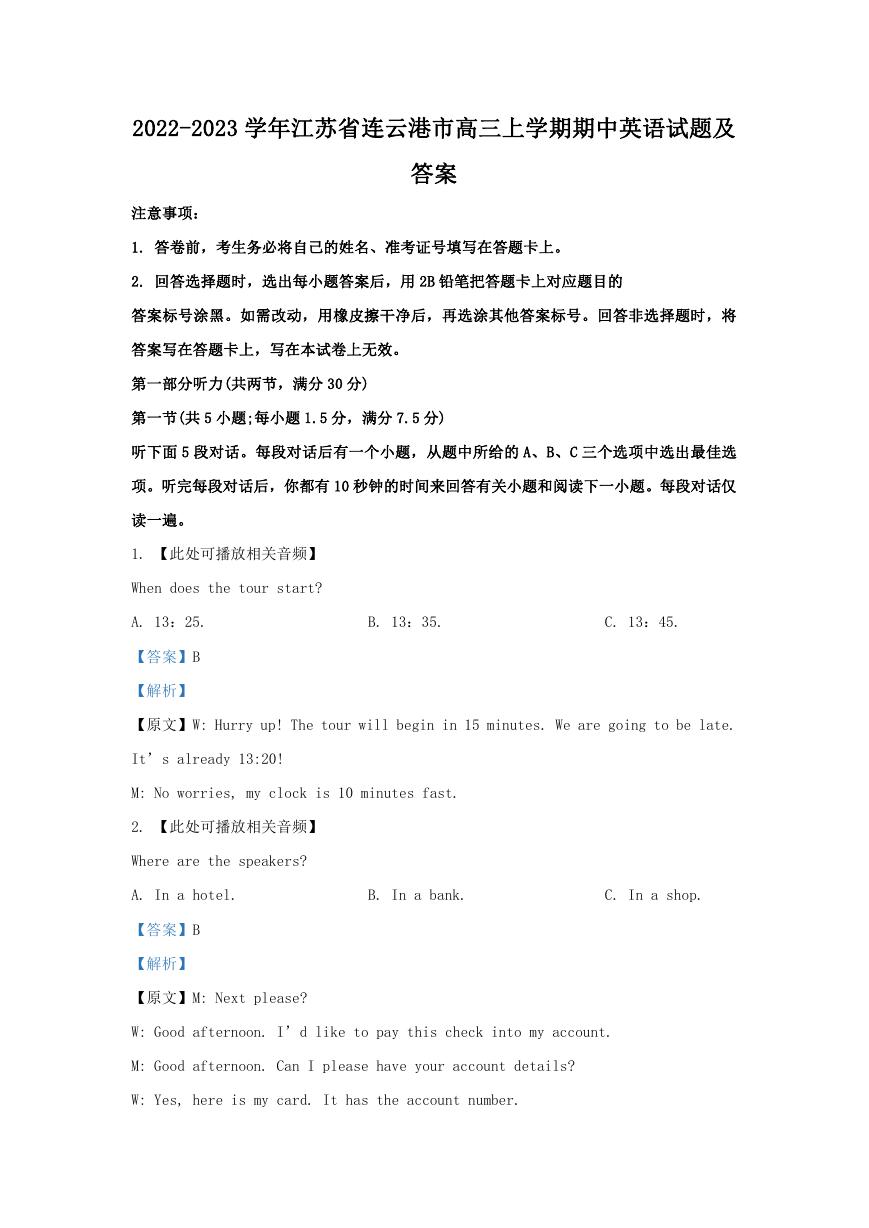
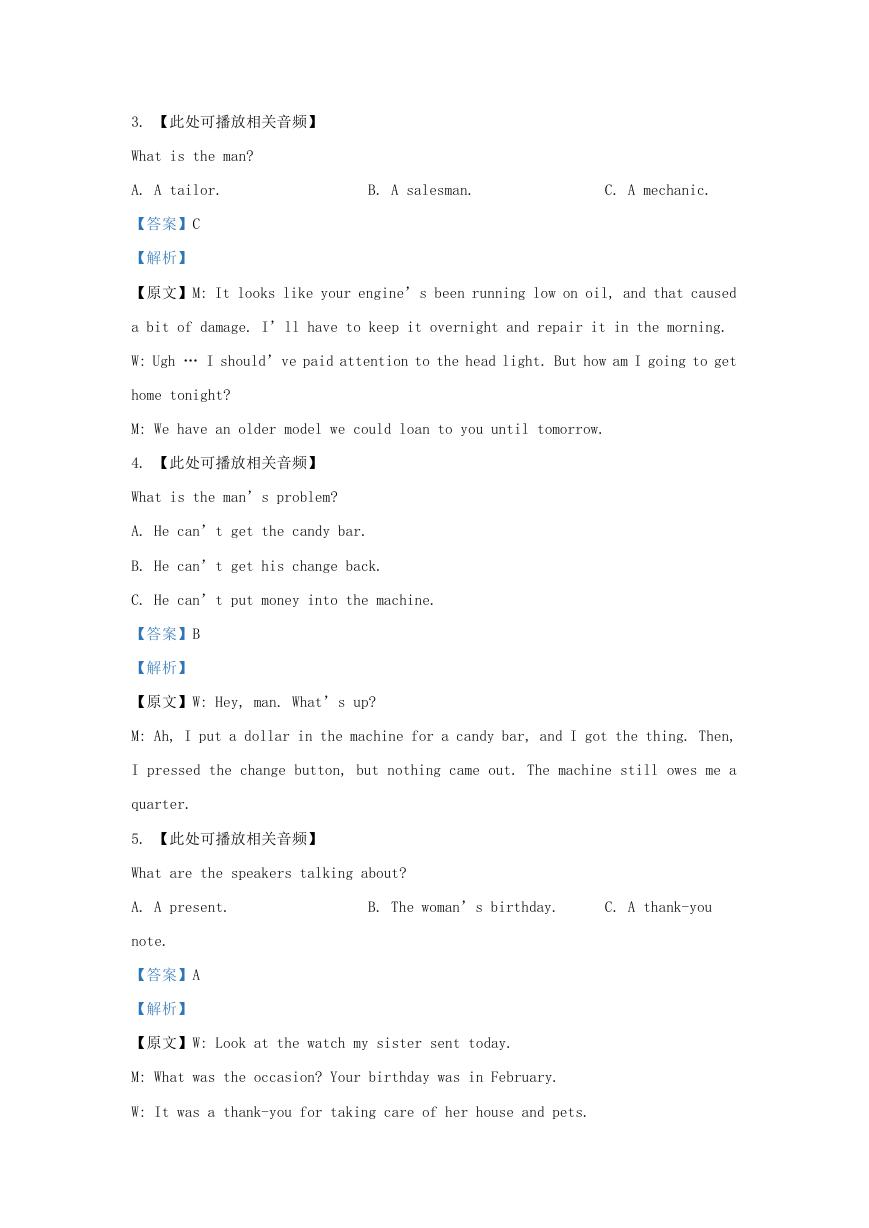
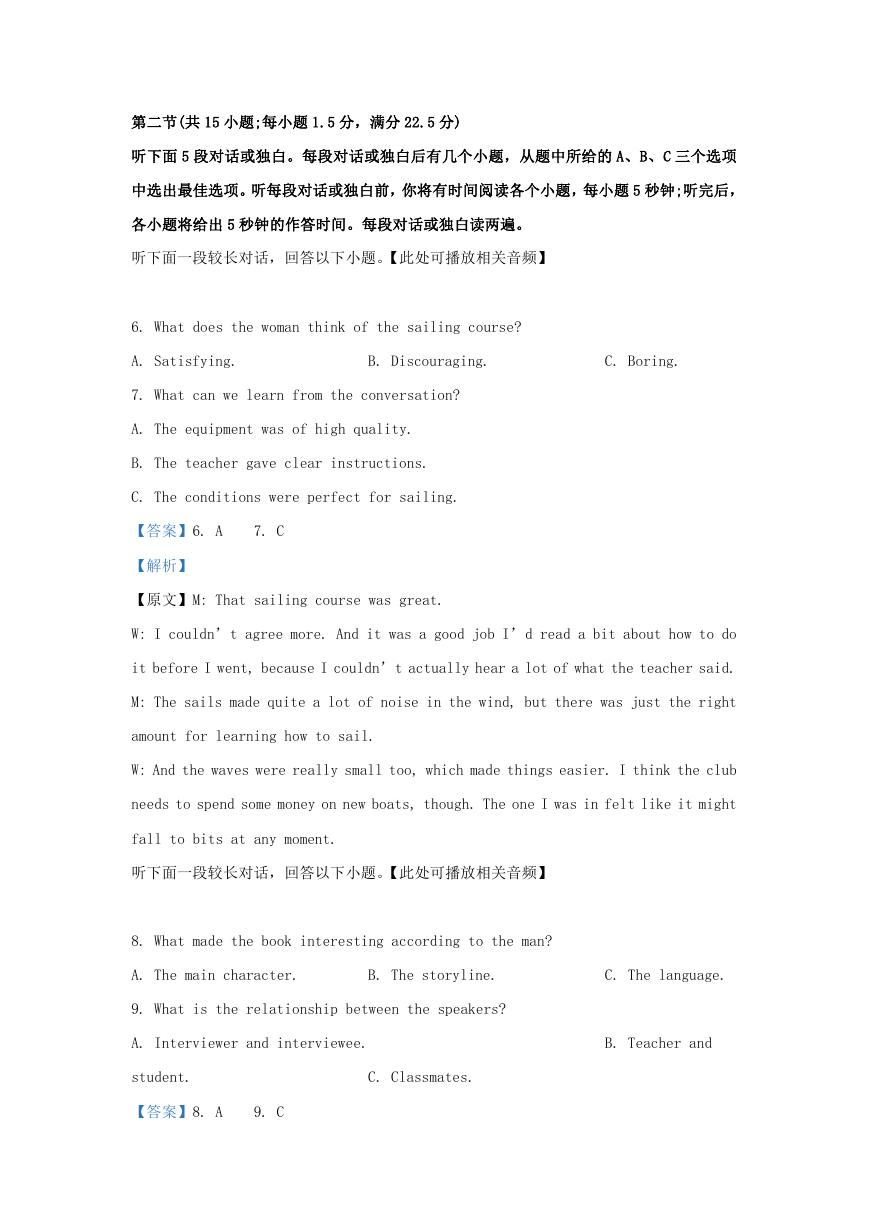

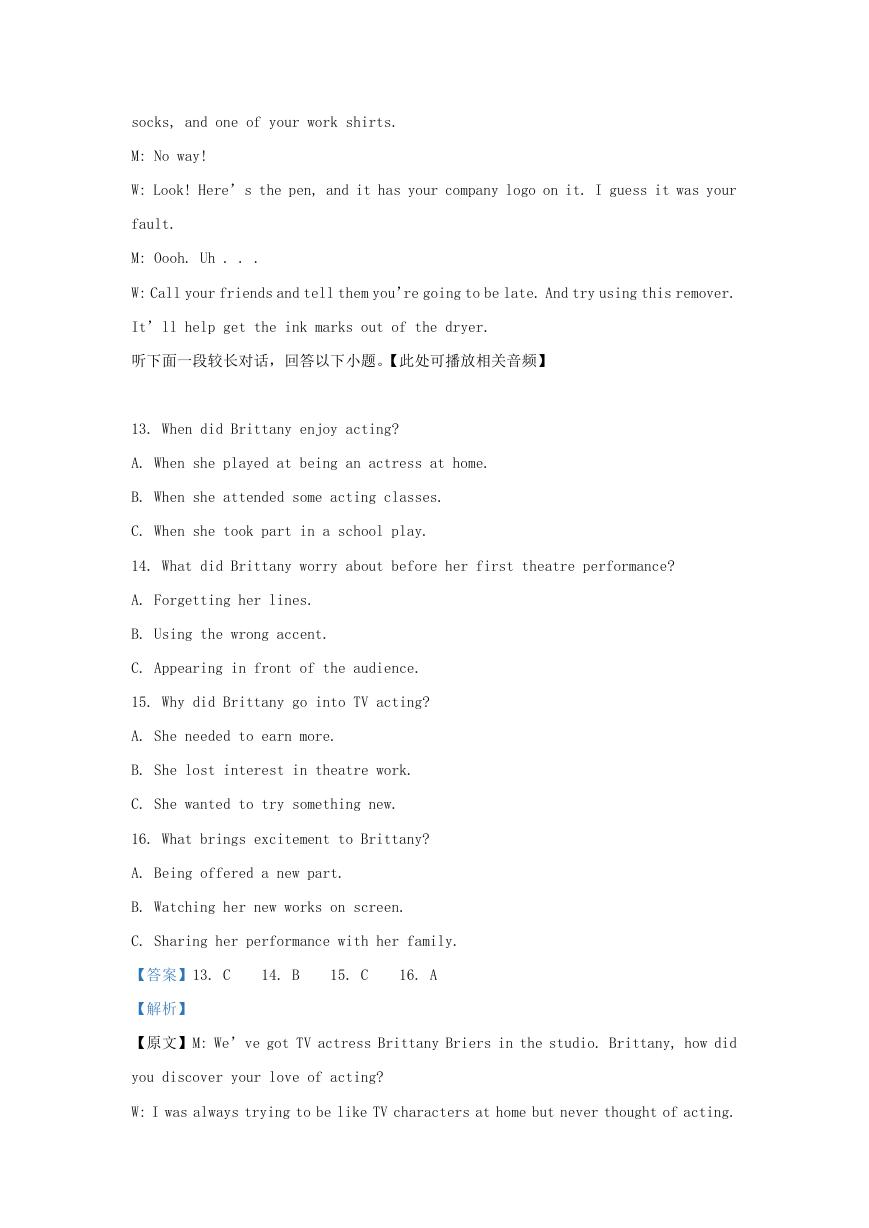

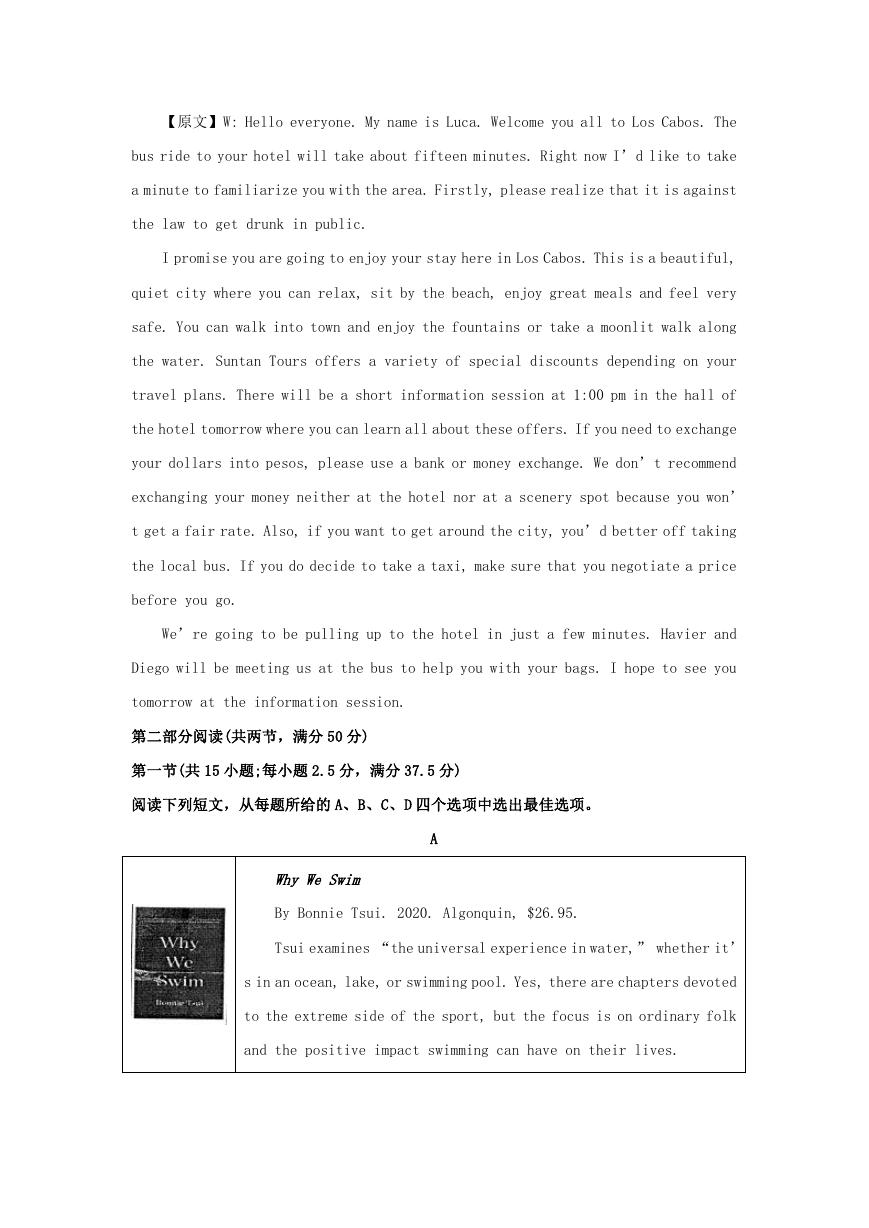
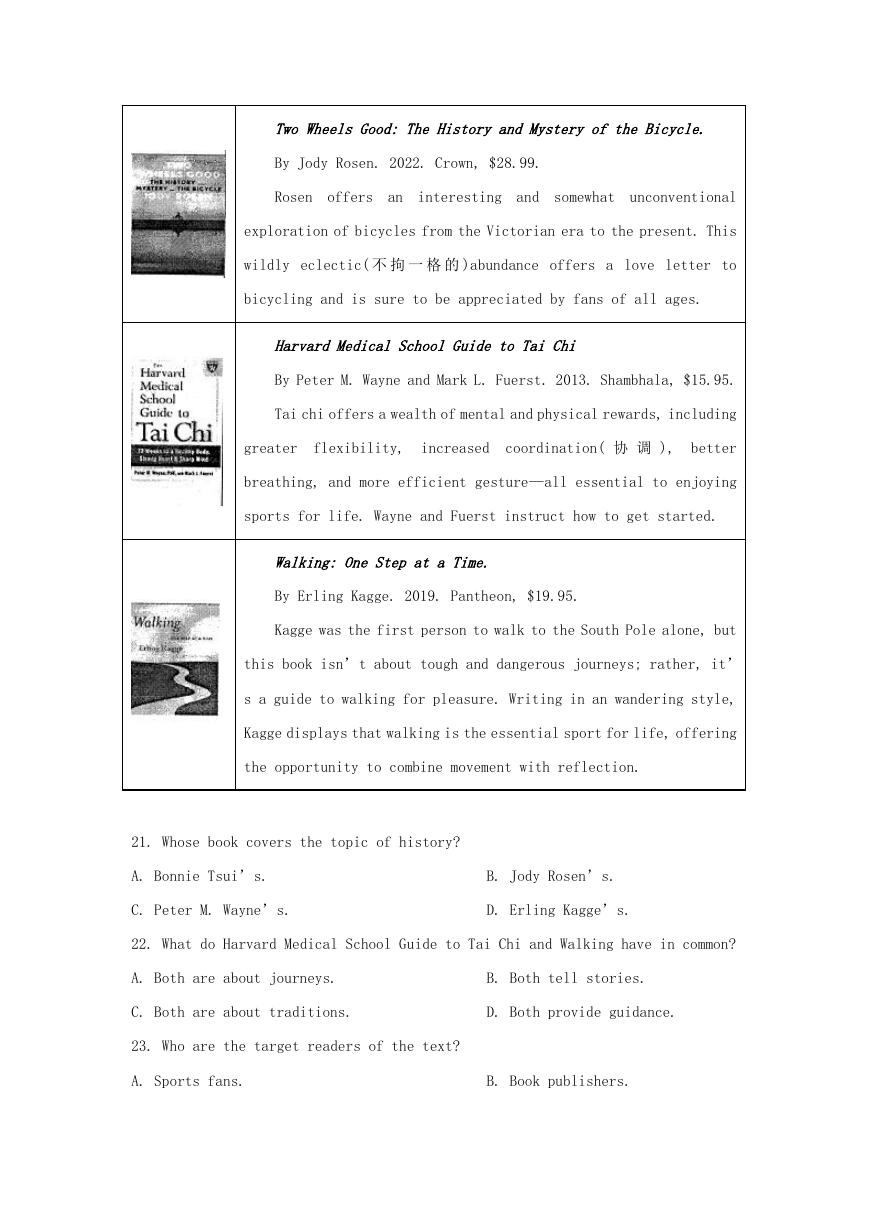








 2023年江西萍乡中考道德与法治真题及答案.doc
2023年江西萍乡中考道德与法治真题及答案.doc 2012年重庆南川中考生物真题及答案.doc
2012年重庆南川中考生物真题及答案.doc 2013年江西师范大学地理学综合及文艺理论基础考研真题.doc
2013年江西师范大学地理学综合及文艺理论基础考研真题.doc 2020年四川甘孜小升初语文真题及答案I卷.doc
2020年四川甘孜小升初语文真题及答案I卷.doc 2020年注册岩土工程师专业基础考试真题及答案.doc
2020年注册岩土工程师专业基础考试真题及答案.doc 2023-2024学年福建省厦门市九年级上学期数学月考试题及答案.doc
2023-2024学年福建省厦门市九年级上学期数学月考试题及答案.doc 2021-2022学年辽宁省沈阳市大东区九年级上学期语文期末试题及答案.doc
2021-2022学年辽宁省沈阳市大东区九年级上学期语文期末试题及答案.doc 2022-2023学年北京东城区初三第一学期物理期末试卷及答案.doc
2022-2023学年北京东城区初三第一学期物理期末试卷及答案.doc 2018上半年江西教师资格初中地理学科知识与教学能力真题及答案.doc
2018上半年江西教师资格初中地理学科知识与教学能力真题及答案.doc 2012年河北国家公务员申论考试真题及答案-省级.doc
2012年河北国家公务员申论考试真题及答案-省级.doc 2020-2021学年江苏省扬州市江都区邵樊片九年级上学期数学第一次质量检测试题及答案.doc
2020-2021学年江苏省扬州市江都区邵樊片九年级上学期数学第一次质量检测试题及答案.doc 2022下半年黑龙江教师资格证中学综合素质真题及答案.doc
2022下半年黑龙江教师资格证中学综合素质真题及答案.doc